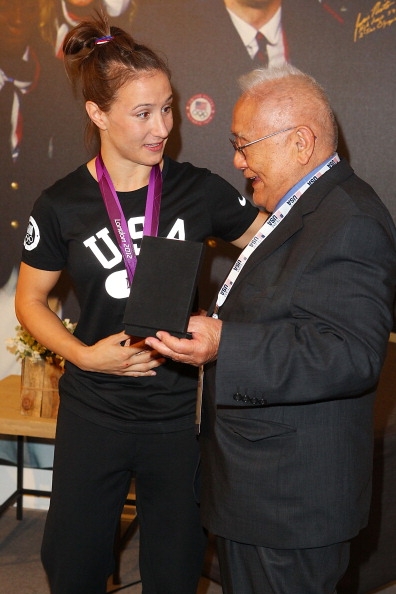 When Marti Malloy won a bronze medal in Judo in the 2012 Olympics, she was happy to look up at the stands and see her former coach, 92 year old Yoshishiro Uchida. Yosh Uchida was more than just a coach, he was also a mentor, who not only helped her to achieve her Judo dreams, but also encouraged her to get a college degree. In addition, while Kayla Harrison celebrates her gold medal in Judo, all US judokas (and indeed, all Olympic Judokas) owe Uchida a debt of gratitude for his role in promoting judo in the US and the world.
When Marti Malloy won a bronze medal in Judo in the 2012 Olympics, she was happy to look up at the stands and see her former coach, 92 year old Yoshishiro Uchida. Yosh Uchida was more than just a coach, he was also a mentor, who not only helped her to achieve her Judo dreams, but also encouraged her to get a college degree. In addition, while Kayla Harrison celebrates her gold medal in Judo, all US judokas (and indeed, all Olympic Judokas) owe Uchida a debt of gratitude for his role in promoting judo in the US and the world.
When Marti Malloy went to study judo with Uchida, she was intent on just focusing on Judo. Uchida pushed her to do more than Judo, to earn a college degree, which she received from San Jose State after making the dean’s list multiple times. I find this an interesting contrast to what some people are saying to Olympic table tennis athlete Ariel Hsing (don’t go to college now).
Uchida’s role in promoting Judo in the US is well documented, and he helped judo become an Olympic sport and coached the first American Judo Team. But judo isn’t the whole story of Yosh Uchida. He served in the U.S. Army during while his family was in internment camps (ironically the Judo building at San Jose State now called Yoshishiro Uchida hall was where his family was processed for the internment). Uchida is also a well established entrepreneur, eventually selling a medical laboratories business for $30 million. If that weren’t enough, he was a force behind the creation of the San Jose Nihonmachi Corporation, which revitalized San Jose’s Japantown, one of only three left in the continental US. I personally appreciate that as I go there fairly often.
Uchida has built an impressive legacy. Not only in judo, business, and in San Jose Japantown, but also in being an example of how to live a well rounded and involved life and how not to let wrongs committed against him turn him angry and bitter. He mentions a key lesson learned from the internment:
“People would come up with all kinds of accusations and things that were not true. But we were not politically involved enough to be able to stop that. You have to be politically involved and know what’s going on. If you’re not politically involved, things happen and there’s nothing you can do about it. Sometimes, you get kicked around. But if you believe in it, just keep pushing ahead. You might have to find out how to get there by going backward and then coming back again. But if you don’t get involved, you won’t live long.”
[Photo by Joe Scarnici/Getty Images for the USOC]




